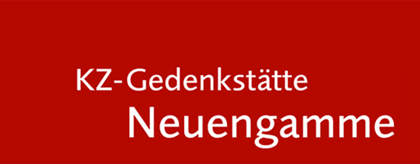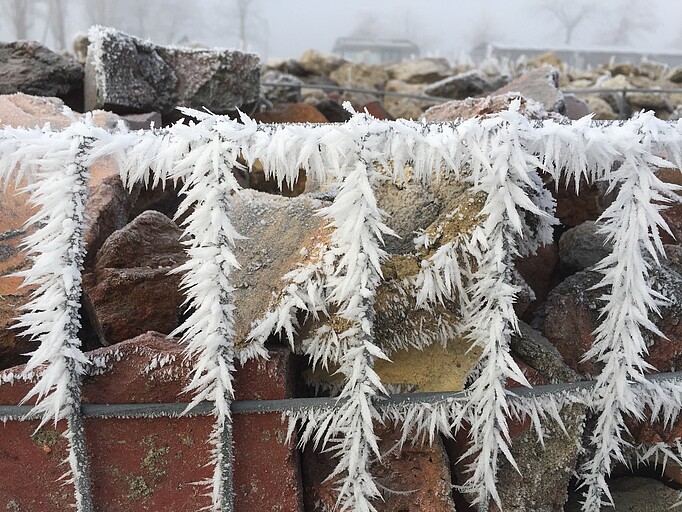12/21/2020 Seasonal Newsletter
Year-end Circular Letter 2020/2021
We would like to take the opportunity of this year-end circular letter to thank you for all the support you have shown us in so many different ways throughout this peculiar year. We also want to give you a brief review of all the topics that have kept us busy over the past twelve months.
Dear Madam, dear Sir, dear Friends,
2020 has, in many respects, brought changes for us all, and that includes the Neuengamme Concentration Camp Memorial. At the beginning of the year for instance, the memorial site and its branch offices were converted into a foundation. But the impact of the global corona pandemic above all meant that the year turned out differently to everything we had planned. Indeed, new ways of jointly commemorating the 75th anniversary of the liberation had to be found at short notice.
The Neuengamme Concentration Camp Memorial had been part of the Hamburg Cultural Authority since 1999, but at the beginning of the year it was converted into the ‘Foundation of Hamburg Memorials and Learning Centres Commemorating the Victims of Nazi Crimes’, an independent foundation under public law. This involved numerous organisational changes, establishing new bodies such as the Foundation Council, the Expert Commission, and the Advisory Committee. It also entailed a greater separation of the economic plans for the Neuengamme Concentration Camp Memorial jointly funded by the Free and Hanseatic City of Hamburg and the federal government on the one hand and, on the other, the memorial sites at Bullenhuser Damm, Fuhlsbüttel, Poppenbüttel, and the denk.mal Hannoverscher Bahnhof, which are funded exclusively by the federal state.
To mark the 75th anniversary of the liberation of prisoners from the Neuengamme concentration camp, we had planned an extensive programme and large-scale commemorative events, with fourteen survivors and 500 family members (most of them from abroad) expected to attend. Ultimately, we were forced to cancel these commemorations as the global corona pandemic took on ever greater proportions. We were, however, able to hold a ‘silent commemoration’ within a small circle in the presence of Hamburg’s First Mayor, the President of the Hamburg Parliament, the Senator for Culture, and a few members of victims’ associations. We set up a website to transfer this year’s commemorations to the virtual realm. In video contributions to the website designed in several languages, survivors, relatives, and politicians submitted their answers to the question: ‘What does the 75th anniversary of the liberation mean to you?’ In doing so, they contributed their own personal perspectives, ensuring that, despite all the restrictions, this significant day was commemorated in a dignified way (https://www.kz-gedenkstaette-neuengamme.de/75befreiung/).
The Space to Remember, Connect and Support is an active commemorative undertaking planned by various associations and implemented by students of the Hamburg University of Fine Arts. It, too, was originally scheduled for May, but was finally officially inaugurated in November. We’re delighted that the relatives have participated so actively, creating posters to commemorate their family members imprisoned at the concentration camp. Even if relatives from many countries were unable to attend due to the renewed pandemic restrictions, we were able to pay tribute to the project with a live broadcast involving an international audience (http://www.ort-der-verbundenheit.org)
The denk.mal Hannoverscher Bahnhof documentation centre took another big step towards its realisation in Hamburg’s HafenCity with a ground-breaking ceremony in February. From 2023, the centre will provide information on the deportation of more than 8,000 Jews, Roma and Sinti from Hamburg and northern Germany. An international conference was also dedicated to ‘Documenting and exhibiting persecution and deportations in Europe from 1938 to 1945’. An extensive companion volume on this subject is to be published next year.
Another conference held in October focused on the ‘Victims of Nazi persecution after the liberation. Experiences of Exclusion and a New Beginning’. This subject matter was also the focal point of the special exhibition put together every year by the Memorial – and, this year, for the first time, by the Foundation – for showcasing at Hamburg City Hall. The exhibition ‘Survived! Now what? Hamburg Victims of Nazi Persecution after their Liberation’ went on show from 16 January to 9 February 2020 to mark the day of remembrance for the Victims of National Socialism. The topic itself was addressed within the city with an extensive programme of events.
In November we were able to organise the 6th ‘Future of Remembrance’ Forum online, with tremendous international participation. Appropriately, this year’s Forum looked at the different ways in which the memory of National Socialism is reflected in the media. This year’s meeting of memorials and initiatives at the sites of former satellite camps of the Neuengamme concentration camp also focused on this topic and the possibilities and difficulties involved in digitising memorial work.
August 2020 saw the launch of the exhibition project ‘Riga as the Site of a Crime and a Place of Remembrance’ supported by Germany’s Federal Foreign Office; its findings are to be presented to the public in Hamburg and several other cities in 2022/23.
Over the past year we also completed several publication projects such as the book "Ein aufgeschobenes Leben" (A Life Postponed) by the Czech concentration camp survivor Edith ‘Dita’ Kraus, which was published jointly with the Foundation of Lower Saxony Memorials. We were also involved in compiling teaching resources on the subject of ‘The Neuengamme Concentration Camp and the City of Hamburg’. We would also like take this opportunity to tell you about a new development in our publishing activities. For 25 years, the journal series on the ‘History of National Socialist Persecution in Northern Germany’ provided a discussion forum on the regional aspects of Nazi persecution in Northern Germany. With Issue 19 (‘Allied Trials and Nazi Crimes’), the editorial team moved away from its orientation on northern Germany in order to focus more fully in future on a larger geographical area and examine international aspects. The first volume of the new ‘Contributions to the History of National Socialist Persecution’, which we will now be publishing in co-operation with the working group on Concentration Camp Memorials in the Federal Republic of Germany, is entitled ‘Between Persecution and Volksgemeinschaft. Childhood and Youth in National Socialism’. All our publications can be purchased from our online shop.
We continue to use the period of pandemic-related restrictions on public visits to our exhibitions to relocate many of our mediation activities to the digital realm. We have for example offered virtual tours via our social media channels, put lectures online, and held our international summer work camp digitally. The project ‘#Waswillstdutun’ provides a platform for online exchanges on the topic of family history. You now also have the opportunity to go on a virtual tour of the Neuengamme Concentration Camp Memorial: http://www.kz-gedenkstaette-neuengamme.de/360tour. New discoveries were also made in the traditional analogue world. This summer, for example, our archive was able to add an exceptional source on the history of Jewish survivors of the Shoah with a passport register dating from 1945.
This year again, we had to say a final goodbye to people who, as prisoners, had survived the Neuengamme Concentration Camp and since been associated with the memorial site for many years. They include Mads Madsen (Denmark), Lucille Eichengreen (USA), Gloria Hollander Lyon (USA), Miloš Poljanšek (Slovenia), Yevgeny Malychin (Ukraine), Haim Liss (Israel), Jerzy Stoberski (Poland). It is especially painful for us that we were no longer able to celebrate this important commemorative year with them.
We wish you all a safe and sound journey through these difficult times. And we hope for a new year that will give us the opportunity to meet up with you in person once again. For now, on behalf of all our staff, may we wish you a contemplative end to the year, and a healthy and peaceful 2021.
Prof. Dr Detlef Garbe, Dr Oliver von Wrochem

